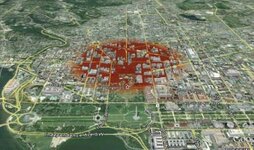DeepseekerADS
Gold Member
- Mar 3, 2013
- 14,880
- 21,725
- Detector(s) used
- CTX, Excal II, EQ800, Fisher 1260X, Tesoro Royal Sabre, Tejon, Garrett ADSIII, Carrot, Stealth 920iX, Keene A52
- Primary Interest:
- Other
A nuclear blast of any size would end D.C. as we know it - District of DeBonis - The Washington Post
http://www.fas.org/irp/agency/dhs/fema/ncr.pdf
Government study predicts the fallout of a nuclear terrorist attack in D.C. - The Buzz - The Washington Post
By Mike DeBonis

The Severe Damage Zone, as estimated by federal researchers. (Department of Homeland Security)
Last November, federal researchers issued a report commissioned by the Department of Homeland Security on what would happen if a relatively small nuclear device — the kind a terrorist group would most likely come to possess — were detonated at 16th and K streets NW.
“National Capital Region: Key Response Planning Factors for the Aftermath of Nuclear Terrorism” was little noticed until the Federation of American Scientists posted a copy of the study on its Secrecy News blog. It was then picked up by this newspaper, Gizmodo and others.
Today, the Associated Press wrote up a story on the report, and it’s a good summation of the aftermath of a terrorist nuclear blast in all its awful detail. But it moved across the wire with an unfortunate headline: “Gov’t report: DC nuke blast wouldn’t destroy city.”
Make no mistake, a nuclear blast of any size would destroy D.C. as we know it.
Yes, the loss of life (45,000 dead) and damage to property caused by a 10-kiloton ground blast — approximately Hiroshima-level — would be nowhere as apocalyptic as the multiple, multi-megaton air bursts that the city would absorb during a Cold War-type nuclear exchange.
Most of the city’s residents would survive and most of its residential neighborhoods would remain intact, but any nuclear blast would be an existential dagger for Washington as a center for government and commerce — a death knell for D.C. as a city worthy of that word.
A blast like the one envisioned in the report would flatten the city’s central business district almost in entirety. At least a third of the municipal tax base would disintegrate in an eye-blink. In the immediate aftermath of the blast, commercial activity in the city would grind to a halt; many federal government functions would be immediately relocated outside of the city. Maybe Congress, on the outer edge of the blast area, could remain — most likely not.
In the longer term, there would be a great decentralization debate — one that started during the Cold War — about whether the old model of the national capital was obsolete, whether new technology makes it unnecessary to have the chief executive, the military, the executive agencies and the Congress all in one place. Some federal politicians, always scornful of Washington, might argue against rebuilding it. Perhaps a new capital might be erected elsewhere in a form more easily to defend against attack, with security measures that would make the bollard look quaint.
Businesses that located in Washington due to its proximity to the halls of federal power would no longer do so, taking jobs out of the city and maybe the region. People who would fill those jobs, or fill jobs providing services to the people who do fill those jobs, would also leave the city. Other businesses not directly tied to the government would see no need to locate in the city core, even after the radiation threat receded. That goes for residents, too, who would reverse the recent decade’s trend of moving closer to the core, closer to employment, closer to urban amenities, sparking a new suburban and exurban diaspora.
Real estate and business investment in the city would evaporate, with few if any banks willing to take a risk on post-nuclear urbanity. With its tax base eroded to a fraction of its needs, the District government would be forced to rely on Congress to maintain the streets, pick up the trash for remaining residents and otherwise pay its bills — if Congress doesn’t revoke home rule outright.
So understand that even a small nuclear blast would create dismal consequences, even without considering the effects a nuclear terrorist incident might have on civil liberties or government continuity or any other aspect of American life. For those of us who love the District of Columbia we’ve built in the past 221 years, however flawed it might be, we must hope and pray and work to make sure such a thing never happens.
By Mike DeBonis | 04:22 PM ET, 03/27/2012
http://www.fas.org/irp/agency/dhs/fema/ncr.pdf
Government study predicts the fallout of a nuclear terrorist attack in D.C. - The Buzz - The Washington Post
By Mike DeBonis

The Severe Damage Zone, as estimated by federal researchers. (Department of Homeland Security)
Last November, federal researchers issued a report commissioned by the Department of Homeland Security on what would happen if a relatively small nuclear device — the kind a terrorist group would most likely come to possess — were detonated at 16th and K streets NW.
“National Capital Region: Key Response Planning Factors for the Aftermath of Nuclear Terrorism” was little noticed until the Federation of American Scientists posted a copy of the study on its Secrecy News blog. It was then picked up by this newspaper, Gizmodo and others.
Today, the Associated Press wrote up a story on the report, and it’s a good summation of the aftermath of a terrorist nuclear blast in all its awful detail. But it moved across the wire with an unfortunate headline: “Gov’t report: DC nuke blast wouldn’t destroy city.”
Make no mistake, a nuclear blast of any size would destroy D.C. as we know it.
Yes, the loss of life (45,000 dead) and damage to property caused by a 10-kiloton ground blast — approximately Hiroshima-level — would be nowhere as apocalyptic as the multiple, multi-megaton air bursts that the city would absorb during a Cold War-type nuclear exchange.
Most of the city’s residents would survive and most of its residential neighborhoods would remain intact, but any nuclear blast would be an existential dagger for Washington as a center for government and commerce — a death knell for D.C. as a city worthy of that word.
A blast like the one envisioned in the report would flatten the city’s central business district almost in entirety. At least a third of the municipal tax base would disintegrate in an eye-blink. In the immediate aftermath of the blast, commercial activity in the city would grind to a halt; many federal government functions would be immediately relocated outside of the city. Maybe Congress, on the outer edge of the blast area, could remain — most likely not.
In the longer term, there would be a great decentralization debate — one that started during the Cold War — about whether the old model of the national capital was obsolete, whether new technology makes it unnecessary to have the chief executive, the military, the executive agencies and the Congress all in one place. Some federal politicians, always scornful of Washington, might argue against rebuilding it. Perhaps a new capital might be erected elsewhere in a form more easily to defend against attack, with security measures that would make the bollard look quaint.
Businesses that located in Washington due to its proximity to the halls of federal power would no longer do so, taking jobs out of the city and maybe the region. People who would fill those jobs, or fill jobs providing services to the people who do fill those jobs, would also leave the city. Other businesses not directly tied to the government would see no need to locate in the city core, even after the radiation threat receded. That goes for residents, too, who would reverse the recent decade’s trend of moving closer to the core, closer to employment, closer to urban amenities, sparking a new suburban and exurban diaspora.
Real estate and business investment in the city would evaporate, with few if any banks willing to take a risk on post-nuclear urbanity. With its tax base eroded to a fraction of its needs, the District government would be forced to rely on Congress to maintain the streets, pick up the trash for remaining residents and otherwise pay its bills — if Congress doesn’t revoke home rule outright.
So understand that even a small nuclear blast would create dismal consequences, even without considering the effects a nuclear terrorist incident might have on civil liberties or government continuity or any other aspect of American life. For those of us who love the District of Columbia we’ve built in the past 221 years, however flawed it might be, we must hope and pray and work to make sure such a thing never happens.
By Mike DeBonis | 04:22 PM ET, 03/27/2012



